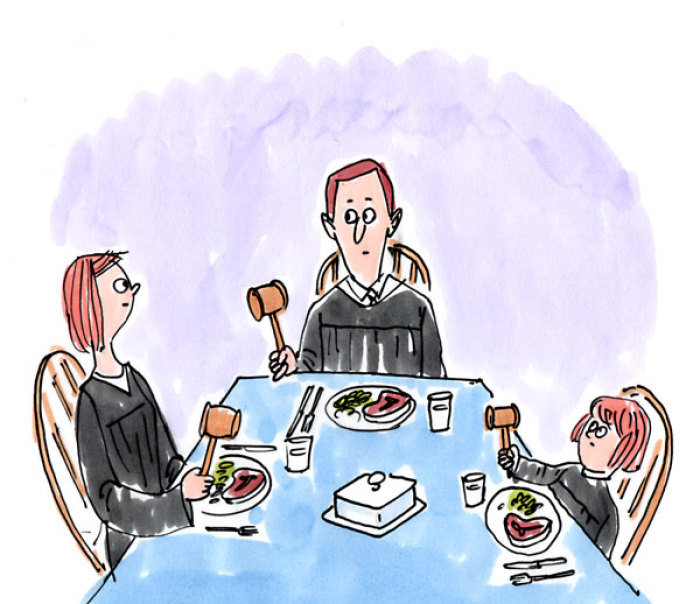Do We Need to Show More Mercy?

We live in a world where there are many opportunities to exercise judgment. We judge what we see, we judge what we hear and we judge what we feel. We judge people's actions, their preferences and often we presume to even know their motivations without ever taking the time to try and understand them.
Our judgments tend to be based on a framework that is built on our own personal biases and life experiences. Our ethnicity, our nationality and our belief system all contribute to the way that we see and relate to the world in which we live in. Every day we make hundreds of split second decisions that are based on a practical need to get through the day. What do I want for breakfast? What should I wear today? Should I turn right or left at the next intersection?
Most of these decisions are harmless and inconsequential to our wellbeing. However, there is a level of decision making that goes way beyond these daily choices that reaches down deep into the fabric of our soul. In this very subjective place within our own heart, there can be a temptation for us to serve as judge and jury not only for others but for ourselves as well. To be clear, I am not talking about godly counsel or correction. Of course, there is a much-needed place for that. What I am speaking about is when we cross over the line of being motivated by love and into an unhealthy place where our opinions and accusations can cause more harm than good. This is the heart condition that Jesus speaks about in Matthew 7:1-2 when He says... "Do not judge, or you too will be judged. 2 For in the same way you judge others, you will be judged, and with the measure you use, it will be measured to you (NIV)."
Even though Jesus Himself tells us to steer clear from judging others, some Christians can even feel a sense of empowerment by the moral authority of Scripture to justify their actions. With thousands of different denominations, the Protestant church has unfortunately had its share of disagreements that have led to many judgments in the past 500 years. Worship styles, end time theology and biblical preferences have all served as fuel for the fire to
justify our need to enforce our convictions upon others. While we may believe that we have the cause of righteousness on our side, we may be guilty of the sin against love. In His high priestly prayer in John 17:20-21, Jesus expresses His desire for love and unity within God's own family when He prays these words… 20 "My prayer is not for them alone. I pray also for those who will believe in me through their message, 21 that all of them may be one, Father, just as you are in me and I am in you. May they also be in us so that the world may believe that you have sent me (NIV)."
Unfortunately, our need to be right at the expense of others can often strike at the very core of Jesus' prayer for unity if our motivations aren't rooted in His love. For when we judge others, we cloud our ability to see beyond our own convictions and that prevents us from fulfilling Jesus' commandment to love others in the same way He has loved us (John 15:12). Think about your own conversion experience. How did Jesus love you? Did He expose your sin and demand that you change before He loved you? …No. Did He disqualify you from becoming born into His Kingdom because your sin was unforgivable? …No. Has Jesus ever rejected any person in the past two thousand years who has sincerely come to Him needing to be saved?
No!
The good news of the gospel for each one of us, is that Jesus looked beyond our own brokenness and loved us at the very core of our being when we were still His enemies (Romans 5:10). And that is the way we are called to love others. With His love, not our own. In 1 Samuel 16:7, God says to the prophet Samuel, that while man looks on the outward appearance, the Lord looks at the heart. While our broken humanity tends to focus on the external and outward appearance, the love of God reaches into the internal recesses of our heart.
The love of God doesn't measure our worthiness in this sacred place. It is the love of God that finds us in our darkness! It is in the secret confines of our heart that the light of His goodness illuminates us from the inside out. All the while transforming us into a new creation that leads to the beautiful place of repentance (Romans 2:4). We see many practical expressions of the transforming love of God in the life of Jesus. When He met a greedy, dishonest business man named Zacchaeus, He saw beyond his cheating behavior and looked into his heart. When Jesus met a Samaritan woman at a well one day, He didn't judge her multiple failed marriages but chose to love instead.
No manner of sin surprised Jesus or served as a barrier to His love for He came to seek and to save those who were lost. The woman caught in the act of adultery. The centurion in the brutal Roman army, and even a condemned criminal sentenced for execution…all were loved with an everlasting love. Even after being beaten and disfigured by those He came to save, hanging on a cross, Jesus cried out the words… Forgive them Father, for they know not what they do!
This is the supernatural love that we are called to love others with. This is the good news that we are to shout from the housetops! God (the Father) was in Christ reconciling the world to Himself, not counting men's sins against them (2 Corinthians 5:18-20). So, if God is not counting, neither should we. Does that mean we are to turn a blind eye to inappropriate behavior to minimize the consequences of sin? But it should come to no surprise to us that people sin because they are sinners. It doesn't shock God and it shouldn't shock us either. It is simply the result of the fall. Sin is an expression of slavery and love is the ultimate expression of freedom. It is only the love of God that has the potential to transform the human heart and set it free. Nothing else can. Not good works, not a noble ideology, not behaviour modification, only God's love. If God the Father is the originator of all love, then God the Son is love expressed in human form. Every connection with Jesus was an encounter with the Father's love. After being loved by God, Zacchaeus was a changed man. After experiencing true acceptance, the woman at the well led her entire community to faith. After their encounters with love, the Roman centurion experienced a miracle and the thief on the cross became the first convert of the New Covenant.
Transformation always happens after an encounter with love, not before. While many people in the gospel accounts were changed by their encounter with love, others weren't. But Jesus kept on loving them anyway because love sees beyond the broken shell of our lives. Love envisions the glorious potential of every human heart and never stops believing. As the Apostle Paul wrote in 1 Corinthians 13:4-8. My hope and prayer is that God's kids all around the world would make God's love their greatest aim (1 Corinthians 14:1) and lay down judgments of those within the church and without. May we stop excusing our own sinful behavior and stop maximizing the shortcomings of others whose sin is different than ours. After all, there is not one gospel message for us and another for those we think are unredeemable. We are all equally sinners and we all need the same Savior. Period.

If the love we proclaim to others is conditional and based on our biases and preferences, it really isn't God's love. If we proclaim a gospel with the primary focus being to manage a person's external behavior, it is not God's love that we are sharing. At best, this definition of love will only leave people with a shallow form of godliness that denies the very power of the gospel. The Apostle John expressed the heart of the gospel when he defined God's love in 1 John 4:10: "This is love: not that we loved God, but that he loved us and sent his Son as an atoning sacrifice for our sins. (NIV)." When we are transformed by our Heavenly Father's initiative of love, it will be the most natural response in the world to simply love Him back (1 John 4:19) and that is where we will begin to see the fruit of a changed life. In a time when we are experiencing battles on many cultural fronts, my encouragement is that as believers, we would lay down every judgment that would prevent us from loving people in the same way that God loves us. I'm not saying we should give up our personal convictions or compromise our beliefs in any way. But what I personally want to do, is to be able to look at people the way that God does, to love them with His love and simply invite them into His amazing family… just the way they are.
While it is common for us to focus on a person's political affiliations, their sexual orientation or their core beliefs, the truth is that God sees beyond the external veneer of their lives and fixes His gaze upon their heart. May we all have eyes to see people through the lens of God's love. For our Heavenly Father is not willing that even one would perish, and He will move heaven and earth to see one of His lost ones come home. I am so thankful that God's love has covered a multitude of sins in my own life and His mercy continues to triumph over every judgment that I deserve. May God give us all the grace to extend this same mercy to everyone we meet so we can all flourish under the waterfall of His mercy together (Matthew 5:7).
Barry Adams is co-founder of Father Heart Communications with his wife, Anneliese. He is an international speaker and author (The Kingdom Belongs To Little Children - Father's Love Letter Devotional) whose passion is to share the life changing message of the Father's love through the following websites:FathersLoveLetter.com and 365Promises.com.




























